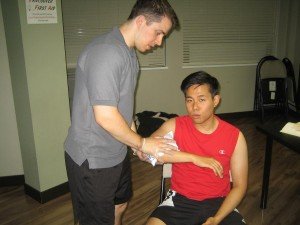An open wound is described as damage involving an internal or external break in the tissues, usually the skin. Almost everyone has experienced an open wound at some point in life. In most cases, an open wound is minor and can be remedied at home.
https://www.youtube.com/watch?v=evgkXI2Pepw
Vehicular accidents, falls or accidents involving tools or pointed objects are the usual causes of open wounds. In serious cases, call for emergency assistance or seek medical attention especially if there is significant bleeding or one that continues for more than 20 minutes.
Common types of open wounds
There are 4 main forms of open wounds that are based on the cause.
- Abrasion – occurs if the skin scrapes or rubs against rough or hard surfaces. The bleeding is typically minor, but this type of open wound requires scrubbing and thorough cleansing to prevent infection.
- Puncture – this is a small hole caused by any pointed object such as an ice pick, nail or needle. The bleeding is minimal but might be deep enough to injure the internal organs.
- Laceration – there is tearing or a deep cut on the skin and usually caused by tools, knives and machinery. In deep injuries, the bleeding can be profuse and extensive.

Apply pressure and raise the affected limb to stop the bleeding and swelling. - Avulsion – this open wound involves partial or full tearing away of the skin and underlying tissue. The injury is likely to occur during violent accidents such as gunshots, explosions or body crushing accidents. In most cases, the bleeding is rapid and heavy.
How to manage an open wound
Home remedies
A minor open wound can be remedied at home. The initial step is to cleanse and disinfect the wound to eliminate any debris and dirt. Apply pressure and raise the affected limb to stop the bleeding and swelling. When covering the wound, utilize sterile bandage or dressing. Make sure that the wound is kept dry and clean for 5 days.
Pain is generally present with any form of wound. Pain medications can be taken as instructed. Cold therapy can be used if there is swelling and bruising.
When to consult a doctor
A doctor should be consulted if the following are present:
- Open wound is deeper than ½ inch
- Bleeding is the outcome of a serious accident
- Bleeding continues more than 20 minutes
- Bleeding could not be controlled with direct pressure
More Information / Disclaimer
The information posted on this page on an open wound is for learning purposes only. Learn to properly manage an open wound by taking a standard first aid course with Saskatoon First Aid.

